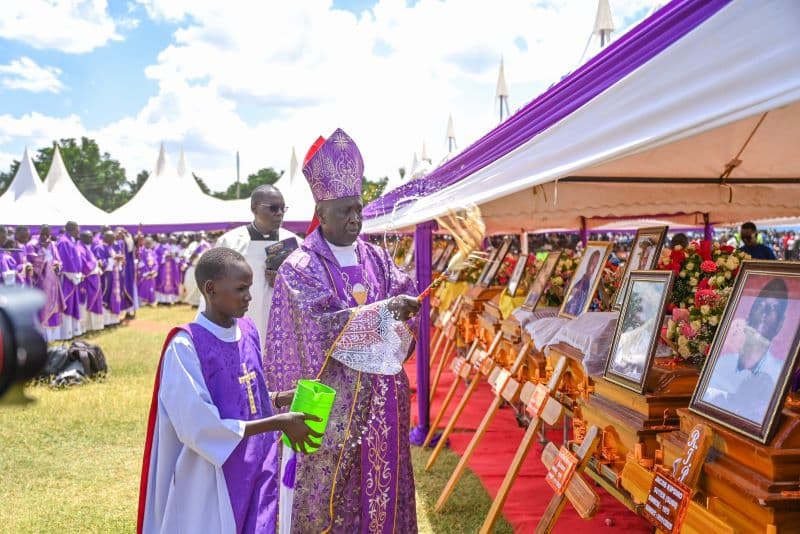We're loading the full news article for you. This includes the article content, images, author information, and related articles.
Following a solemn mass burial for 31 landslide victims in Elgeyo Marakwet, urgent calls intensify for the government to fulfill past promises and relocate thousands living in perennial danger zones along the Kerio Valley escarpment.

CHESONGOCH, ELGEYO MARAKWET – A sombre mood engulfed Chesongoch in the Kerio Valley on Friday, November 21, 2025, as hundreds of mourners gathered for the mass burial of 31 people who perished in catastrophic landslides earlier this month. The emotional ceremony at St. Maurus Academy became a platform for grief-stricken residents and local leaders to issue a powerful, unified demand to the national government: act now to resettle families living on the treacherous, landslide-prone escarpments.
The 31 victims, whose caskets were lined up at the academy grounds, were killed when torrential rains on the night of November 1, 2025, triggered devastating mudslides that swept through at least four villages, including Chesongoch, Murkutwo, Embobut, and Kipkenda. The tragedy claimed a total of 41 lives, with several people still reported missing. The deceased were later interred in a mausoleum adjacent to the service grounds, a decision necessitated after entire homesteads were wiped out, leaving no land for individual burials.
Speaker after speaker at the requiem mass, presided over by Bishop Dominic Kimengich of the Eldoret Catholic Diocese, emphasized that this disaster was not an unforeseen act of nature but the latest chapter in a long, painful history of preventable deaths. Leaders pointed to a recurring pattern of deadly landslides in the region, citing previous tragedies in Kaben and Chesegon, where resettlement promises made over a decade ago remain unfulfilled.
Elgeyo Marakwet Senator William Kisang stated that the county has been severely affected by landslides for over 30 years, highlighting issues of poor land management and environmental degradation. Bishop Kimengich noted that historical insecurity and rampant banditry had forced many families to seek refuge on the steep, uninhabitable slopes, a risk they took for safety. With improved security, leaders argued, the focus must now shift to moving these communities to safer, arable land in the valley.
The region's geology, characterized by steep slopes and loose volcanic soils, makes it inherently unstable, a vulnerability dangerously amplified by human activity. Interior Cabinet Secretary Kipchumba Murkomen, speaking on November 2, attributed the disaster's scale to widespread deforestation and unsustainable farming practices that have destabilized the fragile escarpments.
Representing the national government at the funeral, CS Murkomen assured the affected families of full support, reiterating President William Ruto's directive to expedite aid. He announced that each family who lost a relative would receive KSh 200,000 in compensation, with those injured receiving KSh 150,000. Murkomen stated that funds and building materials have been allocated for reconstruction and urged the community to identify a suitable area for the government to construct new, affordable housing.
“We have enough food aid and even some building materials have been purchased... If possible, the locals should choose one area so that we build affordable houses for them and we reserve another part of the land for farming,” Murkomen said on Friday, November 21.
However, these pledges were met with a degree of skepticism from local leaders who have heard similar promises before. Marakwet East MP Kangogo Bowen stressed the need for a permanent solution. “We have been delving on this matter only when a disaster strikes... As we speak, those people [from the Kaben landslide] are yet to be resettled as promised, more than a decade down the line,” he stated. The collective demand from the community is clear: a comprehensive, state-led resettlement program to move an estimated 100,000 people from high-risk zones along the Kerio Valley escarpments.
The Elgeyo Marakwet tragedy underscores a critical national challenge at the intersection of climate change, land pressure, and historical marginalization. The Kenya Meteorological Department had noted that the ground was already saturated from unusually heavy rains between June and August, compounding the impact of the October-December rainy season. This pattern of extreme weather events, linked to global climate change, is increasing the frequency and intensity of such disasters across Kenya.
The disaster serves as a stark reminder of the urgent need for a national land use policy that addresses settlement in hazardous areas. For years, environmental agencies and geologists have warned that the Elgeyo escarpment is unfit for human habitation, yet communities have remained due to ancestral ties and a lack of viable alternatives. The government's response to this crisis—not just in providing immediate relief but in implementing a sustainable, long-term resettlement strategy—will be a critical test of its commitment to disaster risk reduction and protecting its most vulnerable citizens. The successful relocation and support for the people of Kerio Valley could set a precedent for managing similar climate-related risks across the country.
Keep the conversation in one place—threads here stay linked to the story and in the forums.
Sign in to start a discussion
Start a conversation about this story and keep it linked here.
Other hot threads
E-sports and Gaming Community in Kenya
Active 9 months ago
The Role of Technology in Modern Agriculture (AgriTech)
Active 9 months ago
Popular Recreational Activities Across Counties
Active 9 months ago
Investing in Youth Sports Development Programs
Active 9 months ago
Key figures and persons of interest featured in this article